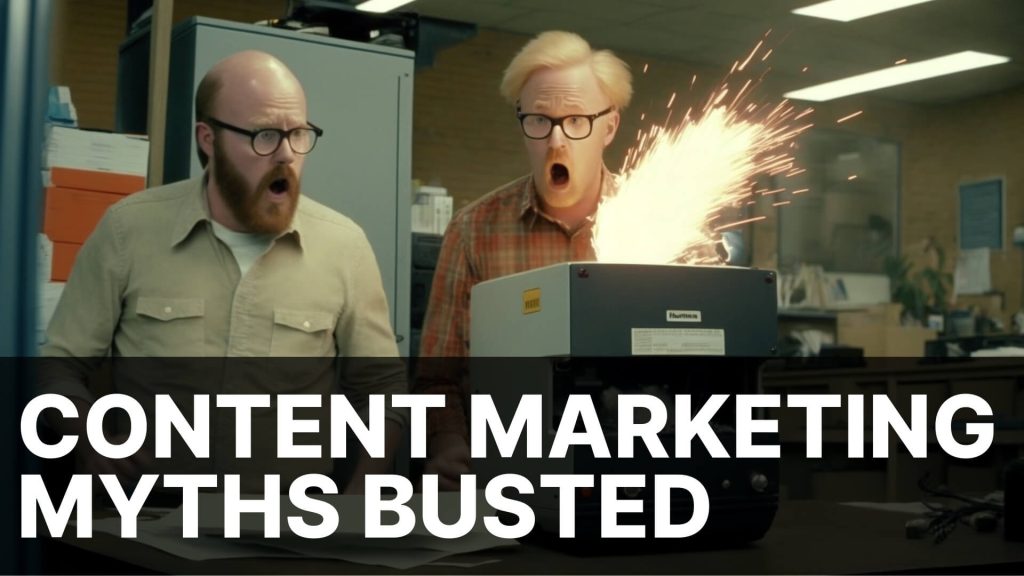Amidst all the fantastic content marketing advice, don’t forget that some of it can be harmful for you as an independent consultant. Much of the advice is tailored for big businesses with deep pockets and sizable teams, or B2C companies that cater to a wider, less discerning audience than a B2B expert service provider may be targeting.
Before I dive in and try to bust the myths, let me just note upfront — there’s a lot of nuance here.
The typical advice is quite often correct and right to follow. It’s just that sometimes it’s not correct and not right to follow, even when its written in an authoritative manner.
Common Advice: You must know your audience
You must understand the needs, preferences, and pain points of your target audience.
My Perspective: Don’t obsess over knowing your audience.
Yes, it’s essential to know who you’re talking to, and this is advice I give to my coaching clients regularly.
But it’s possible to take it too far.
You can spend far too much time trying to understand your audience, only to feel stuck and overwhelmed. Don’t let it paralyze you.
If you focus on creating content that’s valuable and solves a valuable problem, you’ll attract the right people.
Common Advice: You must know yourself
Identify your unique strengths, expertise, and value proposition.
My Perspective: Don’t obsess over knowing yourself.
Again, this is good advice, generally. But it’s easy to go down a rabbit-hole. You could just start creating content and discover something new about yourself by taking action.
Trust that your natural strengths will emerge as you create and share content.
Common Advice: Create a comprehensive marketing strategy
Outline your approach, channels, tactics, and desired outcomes.
My Perspective: Don’t get lost in planning.
It’s great to have a plan, but don’t let it become a roadblock. Have you ever started a project, only to get so caught up in planning that it never progressed? I’ve been there, bought that t-shirt.
Focus on taking action, and refine your strategy as you go.
Common Advice: Quality over quantity
Prioritize creating high-quality, valuable, and informative content that serves your audience’s needs.
My Perspective: We often use this as an excuse to procrastinate.
Quality of content is very important, but consistently publishing content —even when it’s not perfect— can be more beneficial for building an audience & refining your skills. Here are some more thoughts on this one:
- Consistent content creation helps you improve your skills and better understand your audience’s preferences.
- There are diminishing returns when it comes to investing time into your content quality.
- Imperfect content can still provide value and spark conversations. Think about the last time you put off publishing a piece because it wasn’t perfect. Don’t let perfectionism hold you back.
- Regularly publishing content keeps your audience engaged and encourages them to return for more.
Common Advice: Optimize for Search Engines
Implement SEO best practices to improve your content’s visibility in search engine results.
My Perspective: Drop the SEO obsession.
SEO is important, but it shouldn’t be the primary focus of your content creation. Ranking for competitive SEO terms is very difficult and time-consuming.
Social media is the low-hanging fruit, I suggest you focus your efforts there first.
Common Advice: Track Objectives & Analytics
Establish specific, measurable, and achievable content marketing goals. Regularly track and analyze your content marketing efforts to identify successes, areas for improvement, and opportunities for growth.
My Perspective: Don’t be a slave to analytics.
Tracking content performance is important, but obsessing over analytics can be distracting. Metrics can be misleading and don’t reflect the true value of your content.
Focus on creating content that helps your audience solve their problems and achieve their goals. Trust that providing value will lead to engagement
Check out this episode of the podcast where I spoke with Chris Walker about “dark social”.
Common Advice: Learn How to Go Viral
Study viral campaigns, analyze their content and strategies, and apply that to your content.
My Perspective: Forget about going viral.
Viral content often has a short lifespan and may not lead to sustained audience growth or loyalty. Instead, focus your efforts on creating evergreen content that will continue to provide value and attract new audience members over time long after it’s published.
It can also be detrimental or at least less beneficial to go viral too early – check out my conversation with Chris Do in episode 69 where we discussed this.
Conclusion
Content is a long-term play. There’s a huge compounding effect. Try to find a sustainable approach to content creation that works best for you and serves your audience. Don’t be afraid to experiment and carve your own path.
If you like this post, follow me on LinkedIn for more like this!



